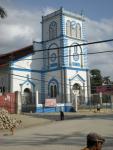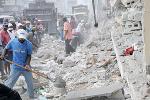Haitian National Rebuilding Action Plan
 The upcoming Haiti Donors Conference is beginning to take shape. According to the Miami Herald, we can expect to hear support for the creation of a 20 member Interim Haiti Recovery Commission (IHRC) to oversee how and where billons of dollars of aid flowing into Haiti are spent over the next 18 months. The IHRC will establish a Haitian Development Authority (HDA) to plan, sequence, and coordinate projects, all of which will require government approval. Take a look at the National Rebuilding Action Plan, based on the Post Disaster Needs Assessment, which will also be discussed at the conference. Thank you to Haiti Vox for posting the English version. There is a lot here to think about. Ill post my thoughts in the comments section, please do the same.
The upcoming Haiti Donors Conference is beginning to take shape. According to the Miami Herald, we can expect to hear support for the creation of a 20 member Interim Haiti Recovery Commission (IHRC) to oversee how and where billons of dollars of aid flowing into Haiti are spent over the next 18 months. The IHRC will establish a Haitian Development Authority (HDA) to plan, sequence, and coordinate projects, all of which will require government approval. Take a look at the National Rebuilding Action Plan, based on the Post Disaster Needs Assessment, which will also be discussed at the conference. Thank you to Haiti Vox for posting the English version. There is a lot here to think about. Ill post my thoughts in the comments section, please do the same.








